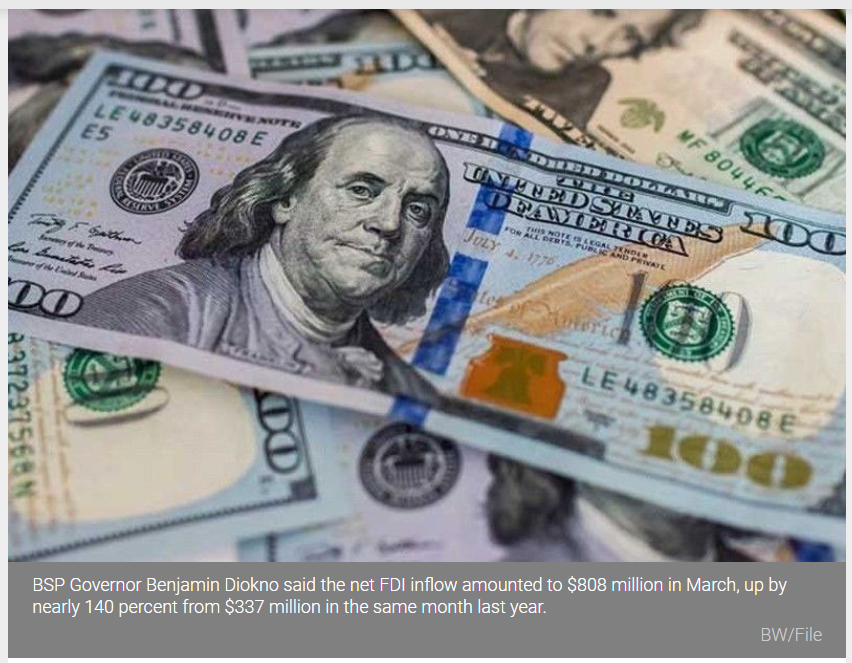Philippines: FDI inflow surges in March
MANILA, Philippines — The net inflow of foreign direct investments (FDIs) more than doubled in March as the gradual reopening of the economy further boosted investor sentiment, according to the Bangko Sentral ng Pilipinas.
BSP Governor Benjamin Diokno said the net FDI inflow amounted to $808 million in March, up by nearly 140 percent from $337 million in the same month last year.
“March 2021 FDI increased on account of improved investor sentiment amid the gradual resumption of domestic activities, while adhering to the minimum health standards, and government efforts to accelerate the vaccination program,” Diokno said.
Preliminary data released by the central bank showed non-residents’ net investments in equity capital jumped by 53 percent to $349 million in March from $229 million in the same month last year.
Equity capital placements coming primarily from Singapore, Japan and the US surged by 36 percent to $377 million. The amount was channeled to electricity, gas, steam, air-conditioning supply industries as well as manufacturing.
On the other hand, equity pulled out from the Philippines plunged by almost 43 percent to $28 million from $49 million.
Net investment in debt instruments consisting mainly of loans extended by parent companies abroad to their local affiliates amounted to $380 million in March, or more than eight times the $45 million booked in the same month last year.
Likewise, reinvestment of earnings increased by 23 percent to $79 million from $64 million.
As a result, Diokno said the net FDI inflow surged by 45 percent to $2.38 billion in the first quarter from $1.64 billion in the same quarter last year.
Equity capital placements from January to March slipped by 6.6 percent to $828 million. The inflows originating mostly from Singapore, Japan, the US and the Netherlands went to electricity, gas, steam, and air-conditioning, financial and insurance as well as manufacturing.
On the other hand, withdrawals fell by 20 percent to $107 million from $134 million.
Meanwhile, net investment in debt instruments more than doubled to $1.43 billion from $671 million, while reinvestment of earnings inched up by 5.4 percent to $225 million from $213 million.
Rizal Commercial Banking Corp. chief economist Michael Ricafort said the decision of debt watchers S&P Global Ratings, Moody’s Investors Service and Fitch Ratings to affirm the investment credit rating of the Philippines manifested the country’s improved economic and credit fundamentals.
Ricafort said the Philippines is the world’s 12th largest state in terms of population at around 110 million, making the country a compelling investment destination as a market and source of business growth for multinational companies.
“Higher credit ratings tend to fundamentally and effectively allow a bigger roster of FDIs into the country, as may be prescribed in their respective mandates,” Ricafort said.
The RCBC economist said the passage of major laws including Republic Act 11534 or the Corporate Recovery and Tax Incentives for Enterprises Act (CREATE) which reduces the corporate income tax rate to 25 percent from 30 percent would continue to boost FDI inflows.
The BSP sees net FDI inflow reaching $7.8 billion this year and $8.8 billion next year. The net FDI inflow into the country has steadily declined after hitting a record $10.3 billion in 2017.
Last year, net inflow slumped by 25 percent to hit a five-year low of $6.54 billion from $8.67 billion in 2019 due to uncertainties brought about by the COVID-19 pandemic. This was the lowest since the $5.64 billion recorded in 2015.
Source: https://www.philstar.com/business/2021/06/11/2104561/fdi-inflow-surges-march


 Thailand
Thailand




